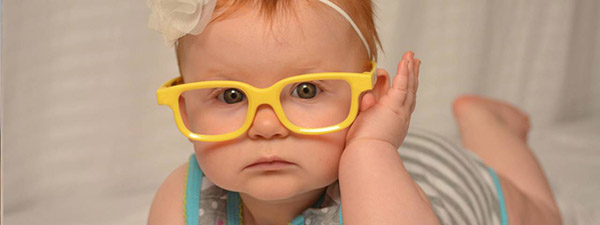
Q: We hear a lot about “seeing your eye doctor regularly.” In school aged children, ages 5 through 17, what does regularly mean?
For children, a regular eye exam typically means once each year. Children are not always aware of changes to their vision and these changes can occur more rapidly during growth sprurts.
Q: What about pre-schoolers? Are there signs parents should look for that would indicate a trip the optometrist is necessary?
It’s helpful for children to have a well baby visit at 6–9 months and return shortly after their second birthday for their next full eye exam. Parents should be watching for any sign of one eye turning inward (toward the nose) or outward. In addition, an eye exam is recommended if a child shows any unusual behaviour when watching TV or looking at an iPad or tablet. This may include frequent eye rubbing, moving quite close to the viewing screen, or turning their head to try to see more easily.
Q: Because many children may be too young to read, how is an eye exam conducted if they cannot read a Snellen Chart?
Fortunately a child does not have to know the alphabet to have a complete eye exam. At Dolman Eyecare we use a chart with common pictures (a birthday cake, a bird, an airplane) and many of the tests are observational.
Q: One of the greatest tasks of a school-aged child is learning to read and in older children, the amount of reading required. What should parents be on the lookout for concerning their child’s reading and potential vision problems?
An eye doctor should be consulted if a child is delayed in their reading skills. An eye exam is also indicated if a child is skipping words or having difficulty finding their place while reading.
Q: We often discuss vision problems as they relate to sitting in a classroom, but what about the playground or visual acuity’s effect on socialization and play?
Children with poor vision might compensate by being overactive or they may tend to do the opposite and be withdrawn socially. Not every child has the same response to poor vision.
Q: Today it seems that many children are very quickly diagnosed as learning disabled or dyslexic. How does vision play into the problems and what are the differences?
Vision and learning is a complex relationship. In order to see properly, a child has to have healthy eyes, clear vision, proper near focus, and comfortable eye alignment. Many children may benefit from traditional prescription glasses, focus exercises, or eye coordination therapy. Once the visual image arrives in the brain centre of sight, it has to be processed. This is called Visual Perception. There are many areas of visual perception difficulties, including dyslexia. We offer Visual Perception Testing, including Dyslexia testing, at Dolman Eyecare Centre.
Q: Vision Therapy is being utilized by some students to address their vision problems. Can you talk about vision therapy and when it is right for your child?
A number of tests are available to help diagnose the underlying cause of vision problems. With a proper diagnosis, a treatment plan can be recommended which may include vision therapy exercises.
Q: We have many choices today to correct our vision. What do you recommend as the earliest age for contact lenses?
Research has shown that children can safely wear contact lenses as young as 8 or 9 years old. The limiting factor tends to be whether the child is comfortable learning the fine dexterity of applying and removing the contact lens. At Dolman Eyecare Centre, we work closely with all children to give them the best chance possible wear contact lenses in a safe and healthy way.
Q: Kids can be hard on glasses. Are there effective glasses for children today that last?
No matter how sturdy the frame and how tough the scratch protective coating is on the surface of the lenses, children will break their frames and their lenses will become scratched. Fortunately, fine scratches do not harm the eyes or get in the way of vision. Ideally your children’s glasses come with a solid 2 year warranty for both the frame and the lenses. All of the frames and lenses at Dolman Eyecare Centre come with a two year warranty.
Learn more about Management of Ocular Diseases.
